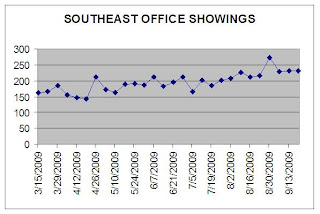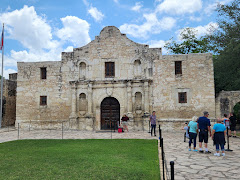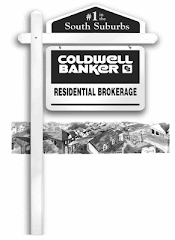"Did you know that a ½% change in interest is approximately equal to a 5% change in sales price?"
Buyers need to realize the importance of the relationship of interest rates to the monthly payments.
Change in Interest vs. Reduced Sales Price
Purchase Price
$200,000
Interest Rate
5%
Term
30
Payment
$1,073.64
½% Increase in Rate
$1,135.58
5% Increase in Price
$1,127.33
A ½% change in interest rates is approximately equal to 5% change in price
1% Increase in Rate
$1,199.10
10% Increase in Price
$1,181.01
A 1% change in interest rates is approximately equal to 10% change in price
Monday, December 7, 2009
Wednesday, November 4, 2009
Short Sale vs Foreclosure. What's the difference?
We are getting many questions as to what is the difference between a Short sale & a Foreclosure. Here is your answer:
Short Sale
1. Homeowner owns the property. .
2. Buyer enters into the executed contract with the homeowner,
subject to lender approval.
3. Property is generally occupied by the owner or tenants.
4. Sold As Is.
5. Timeframe from executuion of Contract: 3-6+ months. Maybe more.
Foreclosure
1. Lender owns the property
2. Lender enters into the executed contract.
3. Utilities are often disconnected.
4. Property is vacant.
5. Sold As Is.
6. Timeframe from execution of contract: 30-60 days or more.
Short Sale
1. Homeowner owns the property. .
2. Buyer enters into the executed contract with the homeowner,
subject to lender approval.
3. Property is generally occupied by the owner or tenants.
4. Sold As Is.
5. Timeframe from executuion of Contract: 3-6+ months. Maybe more.
Foreclosure
1. Lender owns the property
2. Lender enters into the executed contract.
3. Utilities are often disconnected.
4. Property is vacant.
5. Sold As Is.
6. Timeframe from execution of contract: 30-60 days or more.
Labels:
Cathy Higgins,
foreclosure,
Jim Higgins,
Short sale
Monday, October 12, 2009
Update on the Local Real estate Activity

The above graph is from March 15th to September 20, 2009.
These are the number of showings per week, of our Coldwell Banker office listings. Note how they have been on an upward trend.
Real estate activity has been picking up.
We have personally, in 2009, passed our sales for 2008.
The $8000 tax credit has helped and buyers know that home prices are very affordable.
From Aol Finance:
"The housing recovery is one bright spot in our economic recovery. Forecasters expect 2010 to be the first year since 2005 that the housing sector will contribute to overall growth. Home prices are expected to rise 2 percent in 2010."
Let's hope that applies to our local market!
Thursday, September 3, 2009
Real Estate Myths....Fact or Fiction?
Here are a couple Real estate myths that we would like to confirm as facts:
Myth #3: The first offer is never the best offer. Most sellers believe that it’s smart to hold out for something better.
I could name a dozen sellers, right off the top of my head, who wished they had taken that first offer. I don't know why this phenomenon happens, but it is not a myth! Four times out of five, the first offer is the best you’ll ever see.
Myth #4: ‘I can always reduce my price later.’
Sellers often price their home high for a few weeks just to test the market. But buyers shop by price bracket and if your house is in the wrong one, you’ll just help sell everyone else’s home, while yours just sits their overpriced. Reducing your price later in small increments puts you in the position of chasing the tide as it goes out.
Myth #3: The first offer is never the best offer. Most sellers believe that it’s smart to hold out for something better.
I could name a dozen sellers, right off the top of my head, who wished they had taken that first offer. I don't know why this phenomenon happens, but it is not a myth! Four times out of five, the first offer is the best you’ll ever see.
Myth #4: ‘I can always reduce my price later.’
Sellers often price their home high for a few weeks just to test the market. But buyers shop by price bracket and if your house is in the wrong one, you’ll just help sell everyone else’s home, while yours just sits their overpriced. Reducing your price later in small increments puts you in the position of chasing the tide as it goes out.
Friday, August 28, 2009
National Association of Realtors 2008 Survey
NAR 2008 Survey Highlights:
41% of recent home buyers were 1st time buyers
1/3 of home buyers 1st step was to look online for properties
87% of all home buyers used the Internet to search for homes
94% of buyers aged 25 to 44 used the Internet to search for homes
Real estate agents were viewed as a very useful information source by 81% of buyers who used an agent while searching for a home
The typical home buyer searched for 10 weeks and viewed 10 homes
81% of buyers purchased their home through a real estate agent or broker
¼ of 1st time buyers reported that the mortgage process was somewhat more difficult than expected
67% of homebuyers in the Midwest were under 45 years old
The 3 overall factors that most influenced a neighborhood choice were quality of the neighborhood, convenience to job and affordability of homes
The median price paid by recent purchasers in the Midwest was $174,500
81% of buyers found the Internet and agents very useful information source
3% found the house they purchased through the newspapers, 1% through homes magazines
86% of buyers ranked multiple photos as very useful on websites
84% of buyers ranked detailed information as very useful on websites
68% of buyers ranked Virtual Tours as very useful on websites
41% of recent home buyers were 1st time buyers
1/3 of home buyers 1st step was to look online for properties
87% of all home buyers used the Internet to search for homes
94% of buyers aged 25 to 44 used the Internet to search for homes
Real estate agents were viewed as a very useful information source by 81% of buyers who used an agent while searching for a home
The typical home buyer searched for 10 weeks and viewed 10 homes
81% of buyers purchased their home through a real estate agent or broker
¼ of 1st time buyers reported that the mortgage process was somewhat more difficult than expected
67% of homebuyers in the Midwest were under 45 years old
The 3 overall factors that most influenced a neighborhood choice were quality of the neighborhood, convenience to job and affordability of homes
The median price paid by recent purchasers in the Midwest was $174,500
81% of buyers found the Internet and agents very useful information source
3% found the house they purchased through the newspapers, 1% through homes magazines
86% of buyers ranked multiple photos as very useful on websites
84% of buyers ranked detailed information as very useful on websites
68% of buyers ranked Virtual Tours as very useful on websites
Tuesday, August 11, 2009
How Foreclosure Affects Your Credit Score and Your Life
Former clients of Joan Camerlengo, a Staten Island, N.Y.-based real estate broker, succumbed to foreclosure after a major institutional lender handed them a mortgage they couldn't afford. The mortgage involved 100 percent financing through a fixed-rate first mortgage, as well as a monthly adjustable second mortgage. "Within two months of purchasing their new home, it became unaffordable." Camerlengo explains. That's because the interest rate on the second mortgage adjusted to a level they could not afford.
As they struggled to pay their mortgage, other bills went by the wayside, including their cell phone and credit card bills. The lender refused to adjust the terms of the second mortgage, so they were forced to file bankruptcy, which, in turn, will affect their credit for the next seven years. "They lost their home and the situation put a great deal of stress on their marriage."
For millions across the nation, the possibility of foreclosure has become a harsh reality, and many are dealing with the affects foreclosure has on their credit record.
"Lower credit scores can result in being denied credit, such as credit cards and car loans, and facing much higher rates for loans and even other items, such as insurance, that rely on credit scores," explains Andrew Housser, co-CEO of Bills.com, a free consumer personal finance resource, Applying for a new job? Your potential employer may refer to your credit score to determine your trustworthiness and whether or not you would be a responsible employee. Credit card companies may turn down your application. And when it comes time to make another home purchase, it can cost you thousands of more dollars if your credit score isn't above 720.
The Bad News
"A foreclosure will cause a credit score to drop sharply, typically by 200 to 300 points," Housser says. "That would drop a score of 700 -- considered a 'good' score -- to as low as 400 -- considered pretty terrible." The minimum FICO score is 340.
Most lenders rely on credit bureau data, although not all use FICO scores. Some use their own scoring models, but those tend to have the same inputs, which include payment history, debt, new credit, among others. The Good News
But that's not the end of the story. Though a foreclosure can remain active on your credit report for seven years and make it difficult in certain buying situations, it won't ruin your credit score for life, adds Housser.
"If you keep all of your other credit obligations in good standing, your FICO score can begin to rebound in as little as two years. The important thing to remember is that a foreclosure is a single negative item. If you keep it isolated, it will be much less damaging to your credit score than if you had a foreclosure in addition to defaulting on other credit obligations."
How to Rebound
Even in the shadow of a foreclosure, you can improve your credit. Credit counselors advise paying at least the minimum payment on your credit cards each month, keeping only a minimum number of credit cards, and making sure those balances stay low.
Alan M. White, assistant professor at Valparaiso University School of Law in Indiana, encourages those who find themselves in this situation to remain hopeful. "The impact of foreclosure on your score diminishes over time, depending on whether you have other active, on-time accounts," he explains. "Even the FHA [Federal Housing Administration] will allow a new mortgage to be approved if a past foreclosure was more than five years old," he explains.
A foreclosure won't ruin your credit rating forever, but re-establishing good credit takes time and careful planning. If you're in the midst of a foreclosure, you can avoid impacting your credit score even further by prioritizing your spending based on need. Shelter, food, and medical coverage should always come first. Otherwise, reduce your spending by eliminating what isn't a necessity, such as cable, cell phones, dining out or entertainment.
"A foreclosure is not the end of the world. Most people will see their credit scores back in the high-600 range within two to three years," says Patrick Ritchie, author of "The Credit Road Map." "I had a mortgage client who went through a foreclosure and chapter 7 bankruptcy and three years later had a 690 middle FICO score."
As they struggled to pay their mortgage, other bills went by the wayside, including their cell phone and credit card bills. The lender refused to adjust the terms of the second mortgage, so they were forced to file bankruptcy, which, in turn, will affect their credit for the next seven years. "They lost their home and the situation put a great deal of stress on their marriage."
For millions across the nation, the possibility of foreclosure has become a harsh reality, and many are dealing with the affects foreclosure has on their credit record.
"Lower credit scores can result in being denied credit, such as credit cards and car loans, and facing much higher rates for loans and even other items, such as insurance, that rely on credit scores," explains Andrew Housser, co-CEO of Bills.com, a free consumer personal finance resource, Applying for a new job? Your potential employer may refer to your credit score to determine your trustworthiness and whether or not you would be a responsible employee. Credit card companies may turn down your application. And when it comes time to make another home purchase, it can cost you thousands of more dollars if your credit score isn't above 720.
The Bad News
"A foreclosure will cause a credit score to drop sharply, typically by 200 to 300 points," Housser says. "That would drop a score of 700 -- considered a 'good' score -- to as low as 400 -- considered pretty terrible." The minimum FICO score is 340.
Most lenders rely on credit bureau data, although not all use FICO scores. Some use their own scoring models, but those tend to have the same inputs, which include payment history, debt, new credit, among others. The Good News
But that's not the end of the story. Though a foreclosure can remain active on your credit report for seven years and make it difficult in certain buying situations, it won't ruin your credit score for life, adds Housser.
"If you keep all of your other credit obligations in good standing, your FICO score can begin to rebound in as little as two years. The important thing to remember is that a foreclosure is a single negative item. If you keep it isolated, it will be much less damaging to your credit score than if you had a foreclosure in addition to defaulting on other credit obligations."
How to Rebound
Even in the shadow of a foreclosure, you can improve your credit. Credit counselors advise paying at least the minimum payment on your credit cards each month, keeping only a minimum number of credit cards, and making sure those balances stay low.
Alan M. White, assistant professor at Valparaiso University School of Law in Indiana, encourages those who find themselves in this situation to remain hopeful. "The impact of foreclosure on your score diminishes over time, depending on whether you have other active, on-time accounts," he explains. "Even the FHA [Federal Housing Administration] will allow a new mortgage to be approved if a past foreclosure was more than five years old," he explains.
A foreclosure won't ruin your credit rating forever, but re-establishing good credit takes time and careful planning. If you're in the midst of a foreclosure, you can avoid impacting your credit score even further by prioritizing your spending based on need. Shelter, food, and medical coverage should always come first. Otherwise, reduce your spending by eliminating what isn't a necessity, such as cable, cell phones, dining out or entertainment.
"A foreclosure is not the end of the world. Most people will see their credit scores back in the high-600 range within two to three years," says Patrick Ritchie, author of "The Credit Road Map." "I had a mortgage client who went through a foreclosure and chapter 7 bankruptcy and three years later had a 690 middle FICO score."
Monday, June 15, 2009
Thursday, June 11, 2009
Traditional Phases of a Real Estate Market
Phase 1: Unit sales Increasing. Prices Not Increasing.
Phase 2: Unit Sales Increasing. Prices Increasing.
Phase 3: Unit Sales Decreasing. Prices Increasing.
Phase 4: Unit Sales Decreasing. Prices Decreasing.
The Question is: How Long will Phase 4 Last?
Phase 2: Unit Sales Increasing. Prices Increasing.
Phase 3: Unit Sales Decreasing. Prices Increasing.
Phase 4: Unit Sales Decreasing. Prices Decreasing.
The Question is: How Long will Phase 4 Last?
Thursday, March 5, 2009
Credit 101

Credit 101:
Good credit is an important part of the equation in getting a home loan.
Here are the factors that go into a credit score:
1. A credit score is a number that reflects the historical information on a credit report. The number indicates a person's likelihood of becoming deliquent on a loan in the future. The higher the score, the better the terms of the loan such as a lower interest rate.
2. Review your credit report before shopping for a mortgage. You can get a free credit report every year at www.annualcreditreport.com.
3. Errors on a credit score can be fixed. We encourage our clients to get credit counseling for better understand their credit report. To find a HUD approved housing counselor, call 1-800-569-4287.
4. Ordering a credit report will NOT negatively affect your credit score. What does have a major impact is payment history and amount of debt. The longer the credit history, the higher your credit rating, so it's not good to close an unused credit card.
5. A good way to lower your credit score is to reduce debt. Lenders look at a total debt load of no more than 36% of income including house payment.
It's a good idea to get installment debt (car loans, student loans, credit cards) down below 20% of total income.
6. The FICO credit score ranges from 300 to 850, and a higher score can yield a lower interest rate. The FICO credit score is calculated based on five categories:
- Payment History 35%
- Amount owed 30%
- Length of credit history 15%
- New credit 10%
- Types of credit used 10%
Thursday, February 26, 2009
Frequently Asked Questions About the Home Buyer Tax Credit
The American Recovery and Reinvestment Act of 2009 authorizes a tax credit of up to $8,000 for qualified first-time home buyers purchasing a principal residence on or after January 1, 2009 and before December 1, 2009.The following questions and answers provide basic information about the tax credit. If you have more specific questions, we strongly encourage you to consult a qualified tax advisor or legal professional about your unique situation.
1. Who is eligible to claim the tax credit? First-time home buyers purchasing any kind of home—new or resale—are eligible for the tax credit. To qualify for the tax credit, a home purchase must occur on or after January 1, 2009 and before December 1, 2009. For the purposes of the tax credit, the purchase date is the date when closing occurs and the title to the property transfers to the home owner.
2. What is the definition of a first-time home buyer?The law defines "first-time home buyer" as a buyer who has not owned a principal residence during the three-year period prior to the purchase. For married taxpayers, the law tests the homeownership history of both the home buyer and his/her spouse.For example, if you have not owned a home in the past three years but your spouse has owned a principal residence, neither you nor your spouse qualifies for the first-time home buyer tax credit. However, unmarried joint purchasers may allocate the credit amount to any buyer who qualifies as a first-time buyer, such as may occur if a parent jointly purchases a home with a son or daughter. Ownership of a vacation home or rental property not used as a principal residence does not disqualify a buyer as a first-time home buyer.
3. How is the amount of the tax credit determined?The tax credit is equal to 10 percent of the home’s purchase price up to a maximum of $8,000.
4. Are there any income limits for claiming the tax credit?The tax credit amount is reduced for buyers with a modified adjusted gross income (MAGI) of more than $75,000 for single taxpayers and $150,000 for married taxpayers filing a joint return. The tax credit amount is reduced to zero for taxpayers with MAGI of more than $95,000 (single) or $170,000 (married) and is reduced proportionally for taxpayers with MAGIs between these amounts.
5. If my modified adjusted gross income (MAGI) is above the limit, do I qualify for any tax credit?Possibly. It depends on your income. Partial credits of less than $8,000 are available for some taxpayers whose MAGI exceeds the phaseout limits.
6. How is this home buyer tax credit different from the tax credit that Congress enacted in July of 2008?The most significant difference is that this tax credit does not have to be repaid. Because it had to be repaid, the previous "credit" was essentially an interest-free loan. This tax incentive is a true tax credit. However, home buyers must use the residence as a principal residence for at least three years or face recapture of the tax credit amount. Certain exceptions apply.
7. How do I claim the tax credit? Do I need to complete a form or application?Participating in the tax credit program is easy. You claim the tax credit on your federal income tax return. Specifically, home buyers should complete IRS Form 5405 to determine their tax credit amount, and then claim this amount on Line 69 of their 1040 income tax return. No other applications or forms are required, and no pre-approval is necessary. However, you will want to be sure that you qualify for the credit under the income limits and first-time home buyer tests.
8. What types of homes will qualify for the tax credit?Any home that will be used as a principal residence will qualify for the credit. This includes single-family detached homes, attached homes like townhouses and condominiums, manufactured homes (also known as mobile homes) and houseboats. The definition of principal residence is identical to the one used to determine whether you may qualify for the $250,000 / $500,000 capital gain tax exclusion for principal residences.
9. I read that the tax credit is "refundable." What does that mean?The fact that the credit is refundable means that the home buyer credit can be claimed even if the taxpayer has little or no federal income tax liability to offset. Typically this involves the government sending the taxpayer a check for a portion or even all of the amount of the refundable tax credit.For example, if a qualified home buyer expected, notwithstanding the tax credit, federal income tax liability of $5,000 and had tax withholding of $4,000 for the year, then without the tax credit the taxpayer would owe the IRS $1,000 on April 15th. Suppose now that the taxpayer qualified for the $8,000 home buyer tax credit. As a result, the taxpayer would receive a check for $7,000 ($8,000 minus the $1,000 owed).
10. I purchased a home in early 2009 and have already filed to receive the $7,500 tax credit on my 2008 tax returns. How can I claim the new $8,000 tax credit instead?Home buyers in this situation may file an amended 2008 tax return with a 1040X form. You should consult with a tax advisor to ensure you file this return properly.
11. Instead of buying a new home from a home builder, I hired a contractor to construct a home on a lot that I already own. Do I still qualify for the tax credit? Yes. For the purposes of the home buyer tax credit, a principal residence that is constructed by the home owner is treated by the tax code as having been "purchased" on the date the owner first occupies the house. In this situation, the date of first occupancy must be on or after January 1, 2009 and before December 1, 2009.In contrast, for newly-constructed homes bought from a home builder, eligibility for the tax credit is determined by the settlement date.
12. Is a tax credit the same as a tax deduction? No. A tax credit is a dollar-for-dollar reduction in what the taxpayer owes. That means that a taxpayer who owes $8,000 in income taxes and who receives an $8,000 tax credit would owe nothing to the IRS.A tax deduction is subtracted from the amount of income that is taxed. Using the same example, assume the taxpayer is in the 15 percent tax bracket and owes $8,000 in income taxes. If the taxpayer receives an $8,000 deduction, the taxpayer’s tax liability would be reduced by $1,200 (15 percent of $8,000), or lowered from $8,000 to $6,800.
13. I bought a home in 2008. Do I qualify for this credit?No, but if you purchased your first home between April 9, 2008 and January 1, 2009, you may qualify for a different tax credit.
14. For a home purchase in 2009, can I choose whether to treat the purchase as occurring in 2008 or 2009, depending on in which year my credit amount is the largest? Yes. If the applicable income phaseout would reduce your home buyer tax credit amount in 2009 and a larger credit would be available using the 2008 MAGI amounts, then you can choose the year that yields the largest credit amount.
The American Recovery and Reinvestment Act of 2009 authorizes a tax credit of up to $8,000 for qualified first-time home buyers purchasing a principal residence on or after January 1, 2009 and before December 1, 2009.The following questions and answers provide basic information about the tax credit. If you have more specific questions, we strongly encourage you to consult a qualified tax advisor or legal professional about your unique situation.
1. Who is eligible to claim the tax credit? First-time home buyers purchasing any kind of home—new or resale—are eligible for the tax credit. To qualify for the tax credit, a home purchase must occur on or after January 1, 2009 and before December 1, 2009. For the purposes of the tax credit, the purchase date is the date when closing occurs and the title to the property transfers to the home owner.
2. What is the definition of a first-time home buyer?The law defines "first-time home buyer" as a buyer who has not owned a principal residence during the three-year period prior to the purchase. For married taxpayers, the law tests the homeownership history of both the home buyer and his/her spouse.For example, if you have not owned a home in the past three years but your spouse has owned a principal residence, neither you nor your spouse qualifies for the first-time home buyer tax credit. However, unmarried joint purchasers may allocate the credit amount to any buyer who qualifies as a first-time buyer, such as may occur if a parent jointly purchases a home with a son or daughter. Ownership of a vacation home or rental property not used as a principal residence does not disqualify a buyer as a first-time home buyer.
3. How is the amount of the tax credit determined?The tax credit is equal to 10 percent of the home’s purchase price up to a maximum of $8,000.
4. Are there any income limits for claiming the tax credit?The tax credit amount is reduced for buyers with a modified adjusted gross income (MAGI) of more than $75,000 for single taxpayers and $150,000 for married taxpayers filing a joint return. The tax credit amount is reduced to zero for taxpayers with MAGI of more than $95,000 (single) or $170,000 (married) and is reduced proportionally for taxpayers with MAGIs between these amounts.
5. If my modified adjusted gross income (MAGI) is above the limit, do I qualify for any tax credit?Possibly. It depends on your income. Partial credits of less than $8,000 are available for some taxpayers whose MAGI exceeds the phaseout limits.
6. How is this home buyer tax credit different from the tax credit that Congress enacted in July of 2008?The most significant difference is that this tax credit does not have to be repaid. Because it had to be repaid, the previous "credit" was essentially an interest-free loan. This tax incentive is a true tax credit. However, home buyers must use the residence as a principal residence for at least three years or face recapture of the tax credit amount. Certain exceptions apply.
7. How do I claim the tax credit? Do I need to complete a form or application?Participating in the tax credit program is easy. You claim the tax credit on your federal income tax return. Specifically, home buyers should complete IRS Form 5405 to determine their tax credit amount, and then claim this amount on Line 69 of their 1040 income tax return. No other applications or forms are required, and no pre-approval is necessary. However, you will want to be sure that you qualify for the credit under the income limits and first-time home buyer tests.
8. What types of homes will qualify for the tax credit?Any home that will be used as a principal residence will qualify for the credit. This includes single-family detached homes, attached homes like townhouses and condominiums, manufactured homes (also known as mobile homes) and houseboats. The definition of principal residence is identical to the one used to determine whether you may qualify for the $250,000 / $500,000 capital gain tax exclusion for principal residences.
9. I read that the tax credit is "refundable." What does that mean?The fact that the credit is refundable means that the home buyer credit can be claimed even if the taxpayer has little or no federal income tax liability to offset. Typically this involves the government sending the taxpayer a check for a portion or even all of the amount of the refundable tax credit.For example, if a qualified home buyer expected, notwithstanding the tax credit, federal income tax liability of $5,000 and had tax withholding of $4,000 for the year, then without the tax credit the taxpayer would owe the IRS $1,000 on April 15th. Suppose now that the taxpayer qualified for the $8,000 home buyer tax credit. As a result, the taxpayer would receive a check for $7,000 ($8,000 minus the $1,000 owed).
10. I purchased a home in early 2009 and have already filed to receive the $7,500 tax credit on my 2008 tax returns. How can I claim the new $8,000 tax credit instead?Home buyers in this situation may file an amended 2008 tax return with a 1040X form. You should consult with a tax advisor to ensure you file this return properly.
11. Instead of buying a new home from a home builder, I hired a contractor to construct a home on a lot that I already own. Do I still qualify for the tax credit? Yes. For the purposes of the home buyer tax credit, a principal residence that is constructed by the home owner is treated by the tax code as having been "purchased" on the date the owner first occupies the house. In this situation, the date of first occupancy must be on or after January 1, 2009 and before December 1, 2009.In contrast, for newly-constructed homes bought from a home builder, eligibility for the tax credit is determined by the settlement date.
12. Is a tax credit the same as a tax deduction? No. A tax credit is a dollar-for-dollar reduction in what the taxpayer owes. That means that a taxpayer who owes $8,000 in income taxes and who receives an $8,000 tax credit would owe nothing to the IRS.A tax deduction is subtracted from the amount of income that is taxed. Using the same example, assume the taxpayer is in the 15 percent tax bracket and owes $8,000 in income taxes. If the taxpayer receives an $8,000 deduction, the taxpayer’s tax liability would be reduced by $1,200 (15 percent of $8,000), or lowered from $8,000 to $6,800.
13. I bought a home in 2008. Do I qualify for this credit?No, but if you purchased your first home between April 9, 2008 and January 1, 2009, you may qualify for a different tax credit.
14. For a home purchase in 2009, can I choose whether to treat the purchase as occurring in 2008 or 2009, depending on in which year my credit amount is the largest? Yes. If the applicable income phaseout would reduce your home buyer tax credit amount in 2009 and a larger credit would be available using the 2008 MAGI amounts, then you can choose the year that yields the largest credit amount.
Tuesday, February 17, 2009
New Stimulus Package: Taxes and the Housing Market
Taxes
The recovery package has tax breaks for families that send a child to college, purchase a new car, buy a first home or make the one they own more energy efficient.
Millions of workers can expect to see about $13 extra in their weekly paychecks, starting around June, from a new $400 tax credit to be doled out through the rest of the year. Couples would get up to $800. In 2010, the credit would be about $7.70 a week, if it is spread over the entire year.
A $1,000 child tax credit would be extended to more low-income families that don't make enough money to pay income taxes, and poor families with three or more children will get an expanded earned income tax credit.
Middle-income and wealthy taxpayers will be spared from paying the alternative minimum tax, which was designed 40 years ago to make sure wealthy taxpayers paid at least some tax but was never indexed for inflation. Congress fixes it each year, usually in the fall.
Housing:
First-time homebuyers who purchase their homes before Dec. 1 will be eligible for an $8,000 tax credit, and people who buy new cars before the end of the year can write off the sales taxes.
Homeowners who add energy-efficient windows, furnaces and air conditioners can get a tax credit to cover 30% of the costs, up to a total of $1,500.
The recovery package has tax breaks for families that send a child to college, purchase a new car, buy a first home or make the one they own more energy efficient.
Millions of workers can expect to see about $13 extra in their weekly paychecks, starting around June, from a new $400 tax credit to be doled out through the rest of the year. Couples would get up to $800. In 2010, the credit would be about $7.70 a week, if it is spread over the entire year.
A $1,000 child tax credit would be extended to more low-income families that don't make enough money to pay income taxes, and poor families with three or more children will get an expanded earned income tax credit.
Middle-income and wealthy taxpayers will be spared from paying the alternative minimum tax, which was designed 40 years ago to make sure wealthy taxpayers paid at least some tax but was never indexed for inflation. Congress fixes it each year, usually in the fall.
Housing:
First-time homebuyers who purchase their homes before Dec. 1 will be eligible for an $8,000 tax credit, and people who buy new cars before the end of the year can write off the sales taxes.
Homeowners who add energy-efficient windows, furnaces and air conditioners can get a tax credit to cover 30% of the costs, up to a total of $1,500.
Tuesday, January 20, 2009
A Year in Review...2008

Happy New Year from our Family to Yours.
2008 saw fears of a housing recession become a reality as the “sub-prime” collapse and negative media blitz combined to slow down the demand for housing. The incredible rise in home values stalled and retreated to 2001 levels.
Home loan requirements for buyers returned to the “good old days” when qualifying meant good credit, a down payment and a job.
The new market has brought down home prices, but the savvy homeowner used the opportunity to purchase a larger home, and in most cases, came out ahead.
They understood that although the price had fallen on their current home, they had fallen even more on their new “move up” home. They had the foresight to see the “whole picture,” and thus came out ahead with the home of their dreams.
Despite all the negative news, here is some good news:
· Gas prices are 1/2 of what we have recently seen.
· Interest rates are around 5%.
· Chances of a real estate deal falling apart right before closing, due to
They understood that although the price had fallen on their current home, they had fallen even more on their new “move up” home. They had the foresight to see the “whole picture,” and thus came out ahead with the home of their dreams.
Despite all the negative news, here is some good news:
· Gas prices are 1/2 of what we have recently seen.
· Interest rates are around 5%.
· Chances of a real estate deal falling apart right before closing, due to
financing, are much smaller, because buyers are much more qualified.
· Bank of America is spending more than $8 billion to reduce
· Bank of America is spending more than $8 billion to reduce
interest rates so that borrowers can keep their home.
· Real estate lobbyists, from our National Association of Realtors,
· Real estate lobbyists, from our National Association of Realtors,
are pushing for more programs to increase the amount of buyers
and thus demand for existing homes.
· Qualified first time homebuyers can get a $7500 tax free credit,
· Qualified first time homebuyers can get a $7500 tax free credit,
payable at less than $500 per year.
· One of the governments top priority is to stabilize the housing
· One of the governments top priority is to stabilize the housing
market. You will see more programs with the new administration.
· Investors are buying rental properties to get positive cash flow.
Most of us are old enough to know that there are peaks and valleys in life and that includes economic times. A tough market has always evolved into a prosperous one. We will look back at this period as arguably the best time to BUY real estate in decades.
· Investors are buying rental properties to get positive cash flow.
Most of us are old enough to know that there are peaks and valleys in life and that includes economic times. A tough market has always evolved into a prosperous one. We will look back at this period as arguably the best time to BUY real estate in decades.
The experts say, “don’t try to time the market.” Rather, buy in the current “safe zone.” You will profit from having had the courage to buy now (in the safe zone) rather than chance later when values will inevitably rise again.
Thousands of agents are currently leaving the business. We were fortunate enough to work hard in hard times to be the top sales team for our Coldwell Banker office in 2008.
Remember that homes are still selling because people need to buy homes.
We thank you for reading our neighborhood newsletters, your business, for your referrals and helpful ideas.
As we enter our 25th year of serving the community, we wish you and your Family a Happy & healthy 2009!
Thousands of agents are currently leaving the business. We were fortunate enough to work hard in hard times to be the top sales team for our Coldwell Banker office in 2008.
Remember that homes are still selling because people need to buy homes.
We thank you for reading our neighborhood newsletters, your business, for your referrals and helpful ideas.
As we enter our 25th year of serving the community, we wish you and your Family a Happy & healthy 2009!
Subscribe to:
Comments (Atom)













































































































































































